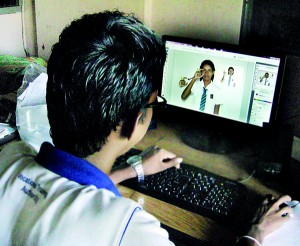Teacher shortage retards education of visually and hearing impaired
A shortage of teachers for special education to teach visually and hearing impaired children is affecting their education in State schools, an institution working for the benefit of these children warned.
“We have many visually and hearing impaired children, but there are not enough teachers to teach these children, which has resulted in unsuccessful special education units in our schools,” Secretary- Sri Lanka Council for the Blind, S.L. Hettiarachchi told Education Times.
He said there was a shortage of those who know Braille, and they face a similar problem concerning Braille books.
“The Education Ministry is not providing enough Braille books to our children. This, as we know, is because the ministry is understaffed in this section,” he said.
There were 25 special education schools in the country, of which two closed down due to shortage of teachers and funds. All these schools are run by private bodies or are assisted.
The Ceylon School for the Deaf and Blind, Ratmalana, is governed by the Diocese of Colombo and managed by a Board of Trustees, with the Bishop of Colombo as Chairman.
It is renowned for aiding many visually and hearing impaired children. The school has a total of about 430 students, of which 230 are in the deaf school.

A student of the School for the Deaf, Ratmalana, looks attentively at his computer, as he creates a portrait to be displayed. Pic by Athula Devapriya
Principal of the School for the Deaf, D. Samanthika Jayasuriya said that the school is suffering from a lack of teachers, as they are not being approved by the government easily.
“We have 22 approved staff teachers paid by the government and 10 board staff teachers paid by the board, which has discouraged many teachers,” she said.
She added that teachers assisting hearing and visual impaired children have to work twice as much as a normal teacher. In addition to that, teachers face hardships covering the O/L or A/L syllabus in time, as it is time consuming. Ms Jayasuriya also said that the current system is not practical, as all the students are not able to pass the general exams.
“It is not easy to pass the O/L and A/L examinations, especially to these children. So wasting time on it is very unfortunate. If we have an exam to differentiate students at an early stage, from those considered capable of success in the exam, as opposed to those who can do something else, then we can prepare the respective students according to their strengths,” she said.
Currently, the school is providing children with vocational training. “These students are very talented in various spheres. To improve this we need a vocational training center within the school,” she said.
She said that the Education Ministry is providing the school with books and uniforms, but this is not enough to uplift the standard and meet the demands of a special education system.
Warden and Printing teacher, Christopher Delmar said that certain benefits given to normal teachers are not given to them. “The government lacks vision on these teachers. We are eligible for an additional 10% of our salary, which we are not paid anymore. We work twice as hard to teach our students, but the government has failed to recognise our effort,” he said.
In addition to this, slates and Braille books provided to the visually impaired students are insufficient.
“As the O/L and A/L question papers are not entirely in Braille, the papers have to be translated into their language at the examination center itself. Sometimes the invigilator reads out the questions, because of this the children are made to listen and answer the questions. This is very unfortunate,” said the Principal of the School for the Blind, Sandya Kodduruarachchi, who has been there for 32 years.
She said that there is an even more serious case when it comes to diagrams. “Maps and diagrams are not provided in tactile, and these children have to rely on the description read out by the invigilator. The children are exhausted because of this,” she said, adding that the rights of these children are not addressed by the ministry.
She concluded that, due to the shortcomings within the education system, visually and hearing impaired children find it very difficult to secure employment.- Aanya Wipulasena
Follow @timesonlinelk
comments powered by Disqus


